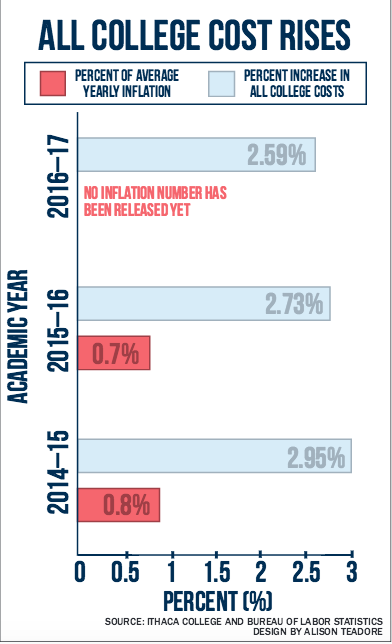The Ithaca College Board of Trustees has approved increases in the tuition, financial aid, salary pool and operating budget of the college during its February meeting.
The operating budget for the 2016–17 fiscal year is set at $238.4 million — a $5.7 million increase from the 2015–16 year — to be funded through an increase in tuition, room and board, the implementation of cost-saving measures and a reduction in the operating surplus.
The total cost of attendance next year for a student, including tuition and a standard double room and board plan, will be $56,766, a 2.59 percent increase over this year’s $55,332.
According to an Intercom message posted Feb. 16 on behalf of President Tom Rochon and Gerald Hector, vice president of finance and administration, the rate of tuition increase has been cut to “historic lows,” with the rise planned for the 2016–17 year being the smallest percentage increase in at least 70 years.
The budget also includes $2.3 million to be allocated for a 2.50 percent increase in the salary pool. The funds will be allocated 1.75 percent to the full general merit pool, and 0.75 percent to the additional merit pool. Last year, $2.1 million of the operating budget was allocated for a 2 percent increase in the salary pool.
In the college’s budget, $118 million is dedicated to institutional financial aid, the highest amount ever, according to the announcement, and $9 million more than last year. The college is categorized as a high-tuition, high-aid institution, Hector said, meaning both the cost of attendance and availability of financial aid are high.
Hector said over the last 10 years, institutional aid has increased from $55.2 million to $118 million — a 113.8 percent increase, making institutional aid the second-largest expense behind salaries and benefits.
“I think it’s great that financial aid is increasing alongside tuition,” said Dominick Recckio, Student Government Association president. “But higher ed is getting more and more expensive, and not many colleges are switching the trend. Even though the financial aid is rising, it’s unbelievable.”
Jason Hamilton, professor and chair of the environmental studies and sciences department, said the college needs to balance affordability and an excellent education.
“Coming to Ithaca College is quite a strain for a lot of people, so I think that this emphasis on trying to keep the college affordable and trying to get money toward financial aid is just crucial for the health and existence of the college,” Hamilton said.
The college is 91 percent dependent upon student-related revenues — the college’s largest source of revenue — to meet its budget targets. For the 2016–17 school year, the estimated enrollment for the freshman class is 1,650, which is 50 fewer students than the 1,700 estimation for the 2015–16 class. The actual full-time enrollment for the 2015–16 freshman class is 1,808 students. No admissions data for the upcoming academic year has been released.
According to the executive summary of the 2016–17 budget, due to the estimated 50-student decrease, it is increasingly important to retain upperclassmen.
“Eventually, we will find ourselves in an upside-down position,” according to the executive summary. “The rate of growth in our expenses is outpacing our largest source of revenue.”
In 2015, the college moved from the 48th most expensive college in the nation, according to a federal government listing, to 78th. Hector said a lower tuition increase, coupled with increased financial aid, could eventually remove the college from the top 100 list.
Hector was unable to define all of the cost-saving measures. However, he cited the strategic sourcing initiative as being a major factor in cutting costs. Last year, Hector said the initiative helped the college reach its goal to reduce nonsalary operating expenses by $3 million in the next two to three years.
Faculty Council Chair Peter Rothbart declined to comment on how the salary pool increase will affect faculty at this point.
Hamilton said compared to inflation rates and the cost of living, a 1.75 percent general merit pool increase is “pretty good.”
On Feb. 23, the college will host its monthly “Dollars and $ense” meeting, which will focus on explaining the new budget to the campus community.
“One of the goals of doing this transparency move we are doing … is to really just try to make a bold claim to say that an informed campus is one that will engage in a dialogue,” Hector said. “Our goal is to educate, educate, educate. That is the mantra we have been using.”
News Editor Faith Meckley contributed reporting.









